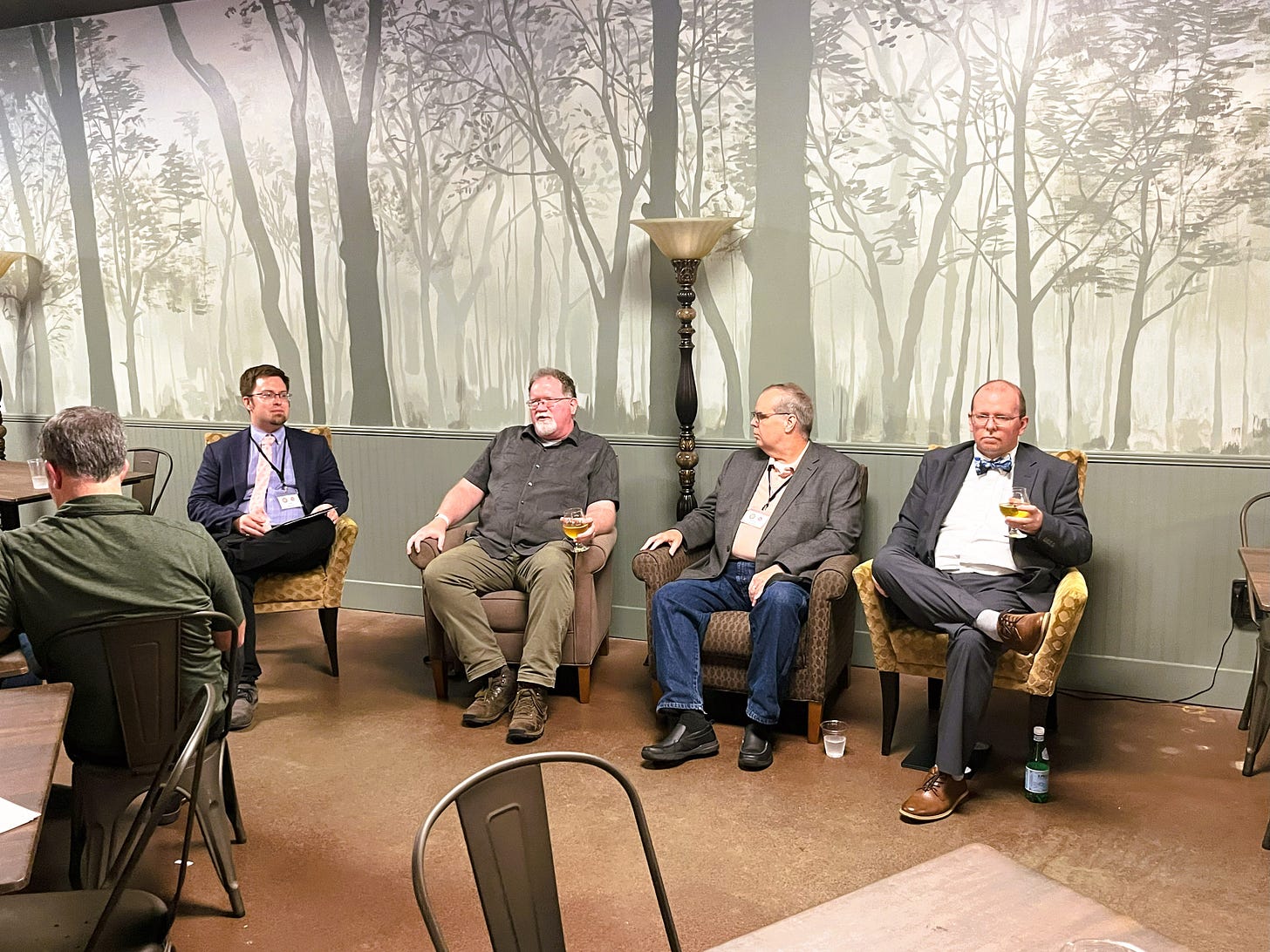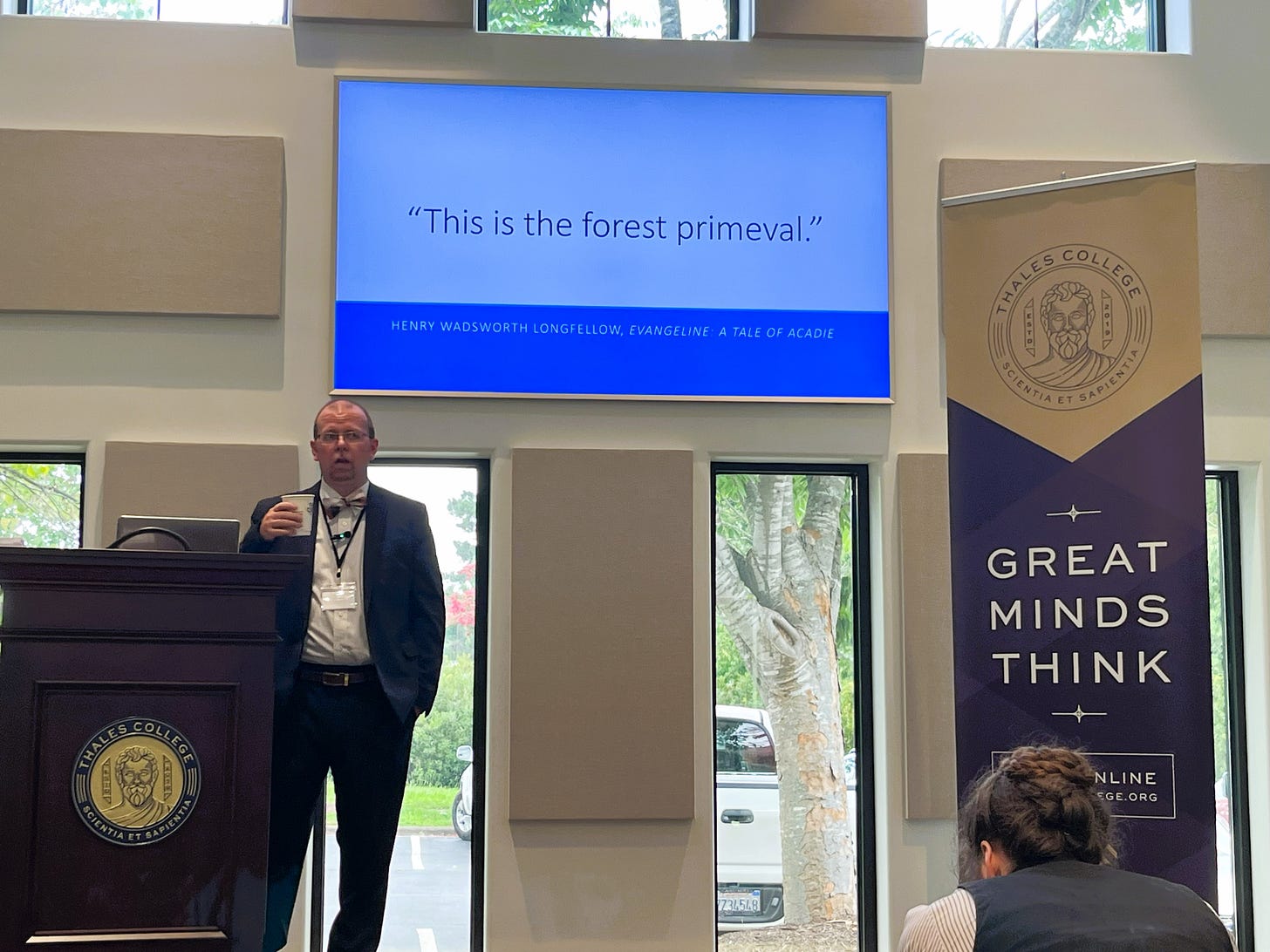August's Parades in the Rain
Digest No. 12 - August 2024
On Commonplacing
Although personally, I think cyberspace means the end of our species . . . everybody on earth knows that innovation only occurs in small groups. Put three people on a committee and they may get something done. Ten people, and it gets harder. Thirty people, and nothing happens. Thirty million, it becomes impossible. That’s the effect of mass media - it keeps anything from happening. Mass media swamps diversity. It makes every place the same.
Michael Crichton, The Lost World, in Jurassic Park / The Lost World (New York: Alfred A. Knopf, 2010. p. 723.
Great Ideas: Man, Idea, Democracy, Quality
Crichton may not be a writer whose work will live on forever, but he certainly possessed something of the prophetic sight. His “science fiction” novels contain some of the most poignant cultural critiques, often decades ahead of their time. His work is sorely underappreciated, and that may be the way it goes. Yet, I am hopeful that those who still read books from that antiquated era we call the twentieth century will give his work a serious consideration. His stories just keep paying dividends.
Reading & Researching
As the school year is starting back up, I’ve been dusting off some work that sat on the back burner for the Summer. I hope to work with two new doctoral students here at the University of Arkansas on some projects for the Lab, possibly something related to the teacher pipeline for classical schools. I’m also connecting with a school in Florida regarding their transition to a classical model, which I hope to have more to say about soon.
My wife and I have begun auditing an Italian course as well. This is a perk of my employee status, for sure. While acquiring the ability to read Italian is part of some larger projects for both of us, we hope to do two primary things by learning Italian: 1) read Dante in the original, and 2) have an excuse to travel to Italy. Otherwise, the rest of my reading is mostly work related, with some family readings interspersed. I’ll need to pick up the pace if I hope to meet my GoodReads challenge this year.
On Writing & Publishing
This should have been in the last digest, but I didn’t know about it in time. Classis, the journal of the ACCS, published my essay on national data and Latin teachers entitled “Whence Comes the Latin Teacher?” It is the first piece for the ACCS that comes directly from some of the work I’ve been doing here at CERL, and I hope it will prove helpful as administrators think through what it will take to hire quality Latin instructors for classical schools. Classis is freely available to ACCS schools and their teachers, but I think you can subscribe to it via their website. I’ve made the essay available on the Document Archive for paid subscribers.
I also have a piece under consideration for the James G. Martin Center connecting Classical Education and American Constitutionalism. I first started thinking about this idea about ten months ago, shortly after George Leef invited me to contribute something to the JMC (eleven months ago). And sometimes, things just take that long. I’ll be sure to link it here when it’s published.
Otherwise, my writing is contained mostly to editing. I’ve got a backlog of work to push through, and I hope to have a fairly clear plate going into October.
On Traveling & Speaking
I started the month off traveling to Wake Forest, NC for the Southern Consortium of Classical Educators Conference. Having helped organize the Central Consortium’s conference back in June, I had a pretty good idea of how things would work. And I originally intended to go merely as a representative for the Classical Education Research Lab, making me more of a participant than normal. Things change, sometimes unexpectedly, and I was asked to help out by taking on a plenary address and a Socratic seminar on Lewis’s “On the Reading of Old Books.” It all came together in the end, though I felt the pressure a bit. My talk turned into a chance for me to reflect on a metaphor I’ve used in the classroom: thinking about the Canon of Western Literature as a forest.
But before I gave my plenary talk, I also participated in a panel on Friday night at Beow’s Books and Brews. The conversation was fun, and the food was great. Overall, Josh Herring organized a wonderful conference, and the three other plenary speakers delivered thoughtful remarks. I was also happy to see friends from Faulkner University and the Ciceronian Society at the conference. The program was hosted by Thales College, which is a very interesting endeavor. I’m glad I was able to go, and if my talk turns into anything else I will be sure to link it here.

I returned home only to turn around and visit a local Classical Christian school to offer a teacher development seminar on the transcendental beauty. The session was borne out of the Roger Scruton reading group I worked with at the end of the Spring and early Summer. I think it turned out well and I hope the teachers found it helpful. My main goal in that presentation was to offer a common language about beauty so that the teachers can speak of it in a way that harmonizes across the school. I believe such linguistic unity is essential for classical schools to succeed.
The rest of August was quiet in terms of travel. But it was far from slow, as homeschooling started back up and the time finally came to move back into my office at the University. September looks to be something more evenly paced.
On Listening
This marks one full year of these digests, and they seem to be well read. To commemorate, below you’ll find the Counting Crows song from which I adapted this digest’s headline. Enjoy!



